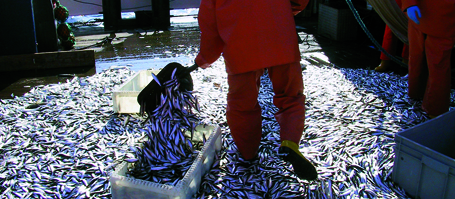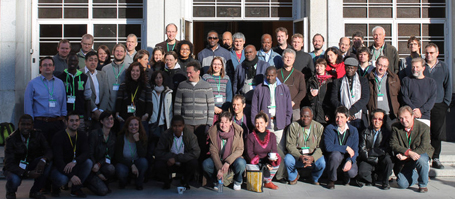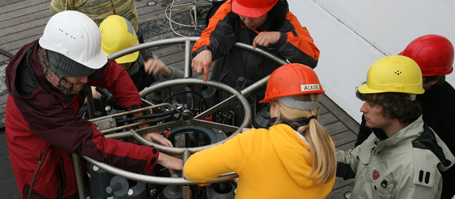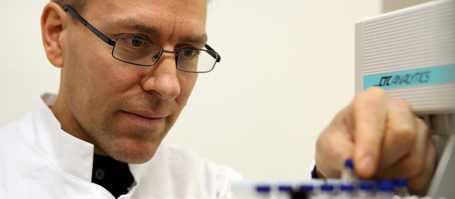The resource economists are in the third floor of a high rise building of Kiel University, right in the city centre of Kiel. Seven kilometers away, the marine biologists from the GEOMAR Helmholtz Centre for Ocean Research enjoy the view of the Kiel Fjord and the passing Baltic ferries. And the scientists from the Institute for the World Economy? They work right around the corner from GEOMAR, also at the Kiel Fjord, only a kilometer further up the road.
Those who work with the interdisciplinary Cluster of Excellence The Future Ocean have to be willing to travel. Numerous times a week, the scientists commute from one location to another, giving lectures, discussing research hypotheses. The Cluster provides four bicycles for its colleagues. It makes for a faster commute and is fun at the same time. Probably no other research association in Germany, if not in all of Europe, has so much expertise on the subject of fisheries as the Cluster in Kiel. The Cluster of Excellence The Future Ocean has existed since 2006. In the summer of 2012, the confirmation for five more years of funding was given. The Cluster combines the knowledge of four Institutions: the Kiel University, the GEOMAR Helmholtz Centre for Ocean Research, the Institute for the World Economy and the Muthesius Academy for Fine Arts and Design.
One of the Cluster’s focal points is the topic area “Living Resources – Fisheries Management”. 18 scientists, including professors, post docs and PhD students work here together. Internationalization is especially important for Kiel: Lectures and seminars are mainly given in English; every fifth member has a foreign background. In the long run, it is the goal that at least every third scientists will come to Kiel from abroad. The Cluster is expanding the cooperations with Columbia University in New York and Dalhousie University in Halifax, Canada. With a healthy self confidence, the Cluster speaker Martin Visbeck, Professor of physical oceanography at GEOMAR, sees Kiel listed in the top ten most important marine research sites.
One could say that the fisheries industry is only a marginal topic. Thus it is easy for Kiel to be highly “ranked”. Nevertheless, here at the Baltic, they do many things differently from other universities. This brings success, scientific recognition and political relevance. At least four disciplines deal with fisheries: economics, biology, law and geography. Resource economists meet marine biologists, environmental ethicists work with business economists. Together they carry out studies that are then published in international scientific journals.
The marine biologist Rainer Froese, who has been at GEOMAR for decades, is fervent about the “wonderful teamwork”. Amongst many other things, Froese initiated Fishbase, the largest fish database in the world. With the founding of the Cluster of Excellence, Froese’s horizon widened: on top of the usual biological approaches to sustainable fisheries came approaches from the side of economics and law.
Together with his colleague, the resource economist Martin Quaas from the Kiel University, Froese recently developed a concept that evaluates the degree of overfishing not only from a biological point of view but also from an economical perspective. Shadow interest rate is the name of the indicator that up to now played no rolein their department. Instead of only concentrating on biologically relevant factors such as stock density and mortality, economic factors are now also flowing into the evaluation of overfished stocks. Professor Quaas and biologist Froese show that fishermen can generate large revenues in future, if they reduce their fishing quota today.
The scientists in Kiel now also integrate legal aspects into marine research, an unusual feat when compared to the general, international research landscape. In a recently published study, marine biologist Froese and lawyer Alexander Proelß analyze the legal consequences when a non-profit, international organization awards an ecological label to a fisheries company that does not bide by specific internationally agreed criteria. The study is important for all consumers buying fish in the supermarket, as it inspects the credibility of ecological labels such as Marine Stewardship Council and Friends of the Sea. Research such as this was the reason for the breakthrough and the sudden media attention. Politicians, people in business and NGOs are now taking advice from Kiel experts. Resource economist Quaas visits Berlin often, informing members of the German federal parliament about fisheries. Marine biologist Froese is regularly invited to Brussels, where the European Commission is revising their fisheries policies.
This is where scientific advice is needed. What are the effects of a set fishing quota on the stocks (biology), on the costs of fisheries (economics) and the regional economies (social economics)? Currently, evolutionary biologist Thorsten Reusch, together with the economist Quaas, is researching the economical effects from a genetics perspective. The gene pool of a stock changes when only large fish are removed. In the long term, the average size of the fish will decrease. This, in turn, will affect the revenue, as smaller fish fetch lower prices.
The scientists from Kiel can now offer politicians and specialist officials holistic answers – in this particular case for the regulation of fisheries management and the mesh size of fishing nets. “Through our work, we can offer politics options for action” says Cluster Speaker Visbeck.
Meanwhile science has gone through a change, believes Visbeck. The fear of contact between science and politics have been overcome by now. For Visbeck it is important to do relevant research. He would now, without a problem, sit at a table with politicians, Greenpeace and the German Deep Sea Fishing Association and ask: What are you interested in? The answers can be given by the fisheries experts from Kiel. Their work is scientifically independent, yet politically relevant.
Author: Marlies Uken, IJP Research Grant 2012
This is an article from the annual report 2011/2012 of the Future Ocean
…



